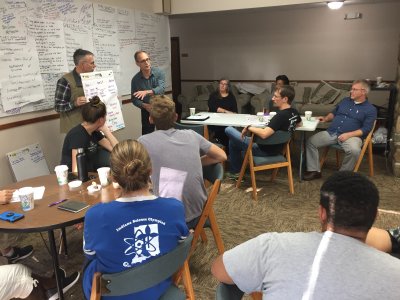Search conference addresses strengths and weaknesses of SST
By Siana Emery ’20
A version of this story originally appeared in The Record
September 12, 1968 marked the inception of Goshen College’s Study-Service Trimester (now Study-Service Term, or SST), with the first units embarking for Costa Rica, Guadeloupe and Jamaica.

Almost exactly 50 years later, 32 faculty, staff and students met for an SST search conference at Camp Amigo on Sept. 14-16, 2018, with the goal of reassessing the distinguished program.
Throughout the course of the weekend intensive, participants tackled this question: “How can we strengthen Goshen College’s international education core, including SST, to make it more effective, engaging and possible for our students in the current global context?”
Under the leadership of Davydd Greenwood, retired anthropology professor and international studies professor at Cornell University and facilitator of the conference, the search conference identified strengths, named problem areas and generated possible solutions to SST and SST Alternative. The weekend concluded with the formation of six task forces, all focusing on specific action items.
These working groups are as follows: Curriculum (comprised of two subgroups – CORE/curriculum changes and models and outcomes), funding, assessing and dealing with risk, integrating all students, creating a new model by learning from the past and addressing competing goals.
The participants of the conference agreed that SST is a distinctive aspect of a Goshen College education. The primary goal moving forward is to remove some identified barriers so that a majority of students can once again experience the semester-long option. These barriers include scheduling conflicts (especially within athletics and large majors), a lack of funds and communication difficulties between staff, students and families.
The committee also wants to develop stronger alternative options for an immersive intercultural experience both at home and abroad. Ideas for this include coming up with creative options for shorter blocks of time.
“The conference was a wonderful experience of having people from across campus in many different roles engage in a collaborative process to make the International Education program better for all students,” said Jan Bender Shetler, professor of history and coordinator of the conference. “There was so much energy and excitement in finding a shared vision and ways to work through the obstacles, even though the hard work is still ahead of us.”
The objective moving forward is to make the “Goshen Global Experience” accessible to all students. Currently, task forces are working collaboratively to generate a unified program (including SST and alternative options) that has a distinctive set of desired outcomes. This proposed program would include different pathways to the same goal, including domestic and international and short and long options.

Upcoming work will also focus on lessening financial and scheduling impediments. While SST costs are part of traditional student tuition, a proposed endowment fund for international education is one idea to alleviate the financial burden for non-traditional students and those who participate in SST during the summer. Other tasks include creating stronger country-specific SST preparation and post-SST processing, and to better equip faculty leadership.
Greenwood and Landon Weldy, a senior and co-facilitator, have compiled a formal report of the conference. This report, which details the process of the conference in depth, can be viewed online at goshen.edu/sst/report.
More information regarding the conference, future actions and ways to get involved will be addressed during Homecoming weekend, Oct. 5-7, in a presentation given by Shetler and Duane Stoltzfus, professor of communication. Homecoming weekend will also feature a presentation on Latinos and SST, given by Weldy and Jose Ortiz, who investigated this topic during a Maple Scholar project this summer.
Now that the framework has been laid, the goal is to begin integrating more voices into the conversation preceding the “Future of Global Education” conference on campus on March 6. Changes are not expected to take place immediately and will require careful and collaborative planning.
“The weekend was really just a first step that depends on continued momentum to improve the SST program,” said Weldy.




